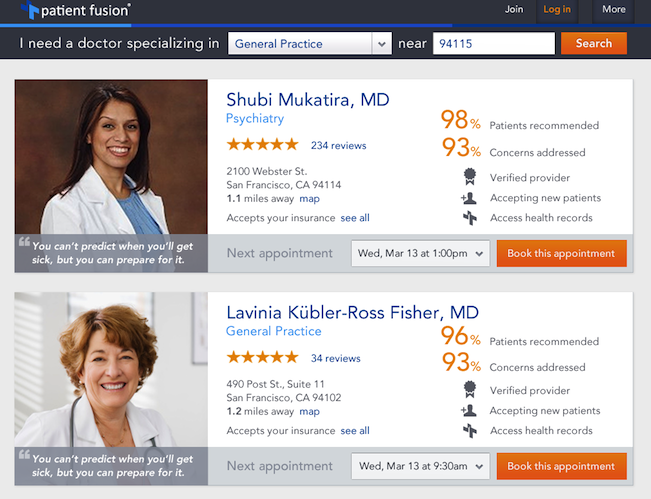Imagine browsing dozens of reviews from past patients before booking a doctor’s appointment — all from a smartphone.
[aditude-amp id="flyingcarpet" targeting='{"env":"staging","page_type":"article","post_id":712725,"post_type":"story","post_chan":"none","tags":null,"ai":false,"category":"none","all_categories":"business,","session":"A"}']This is the vision for Practice Fusion, a San Francisco-based startup that is best known for its free electronic medical record (EMR). Today, the digital health company is launching a web app for scheduling doctor’s appointments, which will be closely followed by iPhone and Android apps.
“We want to facilitate the entire patient journey and life cycle,” said CEO Ryan Howard. The new consumer-facing technology is known as “Patient Fusion,” and Howard describes it as a “Yelp for doctors.”
AI Weekly
The must-read newsletter for AI and Big Data industry written by Khari Johnson, Kyle Wiggers, and Seth Colaner.
Included with VentureBeat Insider and VentureBeat VIP memberships.
We covered Practice Fusion’s history and culture after an office visit. Check out the story here. Howard will be speaking at our upcoming HealthBeat conference.
It’s a strategic move, given that Practice Fusion has already amassed doctor profiles and information about your health, all contained within its EMR. Howard admits that by marketing new products to patients, the company will augment its brand with hospital decision-makers. In a nutshell, Patient Fusion is a smart physician acquisition tool.
Already, Practice Fusion claims it has 3 million open appointments for the month of April alone, more than any of its competition. Roughly half of its user base of doctors have opted in — the app will go live with 27,000 doctors and 1.5 million reviews. These physicians serve an estimated 60 million patients across the U.S.
Patient Fusion is directly competitive with ZocDoc, the New York based scheduling technology that has registered about 30,000 doctors.
According to Howard, it’s still a problem as a third of staff time is spent on “scheduling, and canceling and rescheduling.” Patient Fusion was developed to reduce these inefficiencies, and help patients find an appointment at a well-reviewed doctor nearby.
The app isn’t intended as a monetization stream for the company. But it will be deemed a success if more doctors sign up to the EMR (the company is going after big pharmaceutical advertising deals).
[aditude-amp id="medium1" targeting='{"env":"staging","page_type":"article","post_id":712725,"post_type":"story","post_chan":"none","tags":null,"ai":false,"category":"none","all_categories":"business,","session":"A"}']
Another goal is to use patient’s data to help them find the best doctor; if you suffer from diabetes, for instance, the app will begin to prioritize physicians in the search rankings with relevant expertise.
Howard observed in a recent interview that accessing and mining patient information can save lives. “We can recommend drug therapies based on their popularity [with previous patients],” he said, and claims there are 200,000 avoidable deaths a year because “data is simply not shared.”
Practice Fusion pulled in its most recent $34 million funding round in June 2012, and counts PayPal cofounder Peter Thiel among its investors.
VentureBeat's mission is to be a digital town square for technical decision-makers to gain knowledge about transformative enterprise technology and transact. Learn More

